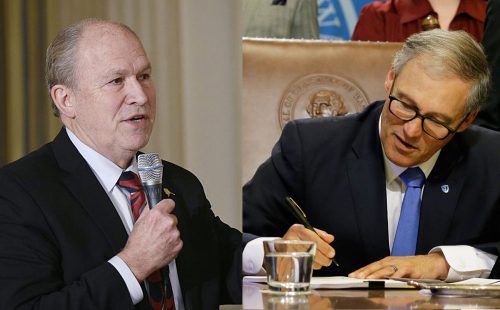The governors of Alaska and Washington are questioning the data cited by U.S. Attorney General Jeff Sessions in recent letters he sent to their states regarding the efficacy of their respective marijuana regulatory regimes.
Governors of four Western states that have legalized recreational marijuana — Alaska, Colorado, Oregon and Washington — each received letters from Sessions dated July 24, responding to a joint letter the governors sent Sessions on April 3. In each letter, Sessions referred to regional and state data depicting serious public health and safety issues arising from marijuana legalization.
The Cannabist has obtained copies of each of the attorney general’s July 24 letters to those states. Late Tuesday, The Cannabist obtained copies of Alaska and Washington’s respective responses to Sessions.

Both states note that the data Sessions utilized when discussing their state’s respective regulatory regimes is out of date and incomplete.
In his July 24 letter to Alaska, Sessions cited data from the state’s 2015 State Trooper Annual Drug Report, and questioned whether the state’s regulatory framework adequately protects federal interests.
Alaska Gov. Bill Walker and his Attorney General Jahna Lindemuth responded in a letter dated Aug. 14 that the 2015 data cited by the attorney general could not “be fairly attributed” to the new marijuana regulatory system since legal sales in the state did not begin until 2016.
“The report simply does not speak to the success or failure of the new regulatory framework,” they wrote.
In their August 15 response to Sessions, Washington Gov. Jay Inlsee and Attorney General Bob Ferguson pushed back forcefully on the U.S. Attorney General’s citation of data from the March 2016 Northwest High Intensity Drug Trafficking Area (NW HIDTA) report on marijuana in the state.
“Your letter … makes a number of allegations that are outdated, incorrect, or based on incomplete information,” they wrote.
Inslee and Furguson pointed out that the HIDTA report Sessions cited was issued just four months before the state implemented legislative reforms that addressed many of the Depart of Justice’s (DOJ) concerns.
Sessions had also cited the report in stating that Washington marijuana had been diverted to 43 other states. Inslee and Ferguson argued that this finding was based on statistics covering “several years before our recreational sales began,” they wrote.
The pair also called out Sessions for repeatedly failing to “distinguish between marijuana activity that is legal and illegal.” By conflating the two, Sessions implied that state-legal marijuana was responsible for harms actually caused by illegal activity, they wrote.
In addition, they wrote, “Some of the statistics cited in your letter are simply incorrect, or based on misreading of their context.” In this category they included an incorrect and highly inflated calculation about driving while under the influence.
The Cannabist has confirmed a response will be forthcoming from Colorado Gov. John Hickenlooper and has made an inquiry to Oregon Gov. Kate Brown’s office.
Timeline
‘Something’s going to have to give’: An untenable conflict between feds, legalized states
Teaming up: Four governors urge feds to keep marijuana enforcement status quo
Research: AG Jeff Sessions directs task force to review federal marijuana policies
Update: After meeting with Sessions, Colorado gov thinks AG unlikely to crack down on marijuana
Fact-finding: Feds visit Colorado to research marijuana regulation, black market, enforcement
Response: Sessions raises “serious questions” about Colorado and Washington’s marijuana management in letter to govs
One more letter: Sessions hits familiar, doubtful themes on cannabis regulation in letter to Alaska
The letter from Alaska officials also raised the issue of states rights, including state law enforcement.
“The exercise of traditional police powers in an area where primary enforcement should be left to the individual states,” they wrote. “While we share your concern about the dangers of drug abuse, Alaskans voted to establish a regulated industry.”
Washington officials echoed that sentiment, stating, “State and federal prohibition of marijuana failed to prevent widespread use, which was generating huge profits for violent criminal organizations. The people of Washington State chose a different path.”
In all four letters, Sessions indicated that he sees flexibility for federal enforcement actions under the 2013 Cole Memorandum — Obama-era guidance for how prosecutors and law enforcement could prioritize their marijuana-related enforcement efforts.
Alaska implored Sessions to maintain the status quo regarding the Cole Memo: “We ask that the DOJ maintain its existing marijuana policies because the State relied on those assurances in shaping our regulatory framework, and because existing policies appropriately focus federal efforts on federal interests.”
Washington attached to their letter a report entitled “Marijuana legalization in Washington State.” They said the report “describes how our state’s regulatory system is designed specifically to meet the DOJ’s Cole Memorandum guidance and promote the enforcement priorities that we share with DOJ.”
Inslee and Furguson made a renewed request to meet with Sessions in person to discuss other factual disagreements. “If we can engage in a more direct dialogue, we might avoid this sort of miscommunication and make progress on the issues that are important to both of us.”
Read Washington Gov. Jay Inslee’s response to AG Jeff Sessions 8/15/17
Read Alaska Gov. Bill Walker’s response to AG Jeff Sessions 8/14/17
